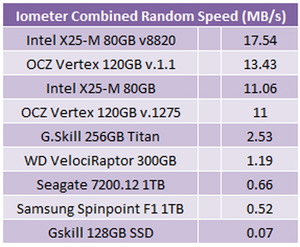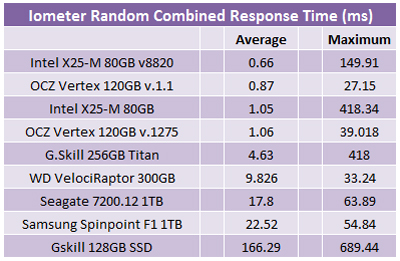
Iometer Results
Website: IometerIometer is a powerful open source synthetic benchmarking tool, able to simulate the effects of a wide variety of software loads and circumstances on either individual hard disk drives and complete drive arrays. In the past we've chosen not to include it due to bit-tech's traditional preference towards real world benchmarks. However, to correctly check for drive stutter caused by extremely high random write latencies there aren't a great deal of options, so we've finally decided to include Iometer in our hard disk testing suite.
For our Iometer testing we used a 4GB portion of the drive and subjected it to random read or write commands or both, depending on the test, of 4KB, with three outstanding I/Os to simulate high level multi-tasking. We ran this each test for two minutes, repeating three times to ensure we recorded an accurate result.
As the differences in read and write latencies and speeds can be so pronounced, we've also included tables of information where appropriate, to help make understanding the random read/write performance differences between different SSDs and conventional hard disk drives easier.
 Testing one hundred percent random read or write speeds is fine, but in reality you'll unlikely be doing just one or the other, a modern operating system realistically performing dozens of random read or write tasks at a time. Imagine for example you're playing a game, listening to music and downloading all at once, placing a very demanding mixed load onto your hard disk drive.
Testing one hundred percent random read or write speeds is fine, but in reality you'll unlikely be doing just one or the other, a modern operating system realistically performing dozens of random read or write tasks at a time. Imagine for example you're playing a game, listening to music and downloading all at once, placing a very demanding mixed load onto your hard disk drive. Strangely, the Intel X25-M seems to fall a little flat here, and despite delivering random read speeds of 22.92MB/s and random write speeds of 39.49MB/s using the 8820 firmware only delivers 17.54MB/s when faced with an ultra heavy combined random read/write load. However, it's still the fastest drive out there for combined random read write, an interesting fact considering its one sequential performance flaw is its combined read/write results.
Pleasingly though the OCZ Vertex once again shows itself to be an excellent performer, producing an average speed of 13.43MB/s when tasked with our combined read/write test - an excellent result which shames previous generations of SSDs and which utterly annihilates conventional mechanical drives.
 Due to the more demanding nature of our combined read/write tests, the OCZ Vertex doesn't perform as well here as it does when faced with solely random read or random write artificial loads, with the maximum latency increasing to 27ms using the latests v1.1 firmware. However, this is still in a completely different league to the previous generation's SSDs, where maximum latencies are in excess of 400ms, and you can rest assured that even with the most demanding random read/write work load, the OCZ Vertex is going to perform superbly.
Due to the more demanding nature of our combined read/write tests, the OCZ Vertex doesn't perform as well here as it does when faced with solely random read or random write artificial loads, with the maximum latency increasing to 27ms using the latests v1.1 firmware. However, this is still in a completely different league to the previous generation's SSDs, where maximum latencies are in excess of 400ms, and you can rest assured that even with the most demanding random read/write work load, the OCZ Vertex is going to perform superbly. In comparison the dual JMF 602 based Titan, while able to post a very respectable combined read/write average latency of just 4.6ms, again runs foul of high maximum latencies. The same is true of the single JMF 602 based G.Skill 128GB SSD, which is crippled by its high write latencies and clearly suffers when faced with combined random read/write loads.

MSI MPG Velox 100R Chassis Review
October 14 2021 | 15:04








Want to comment? Please log in.